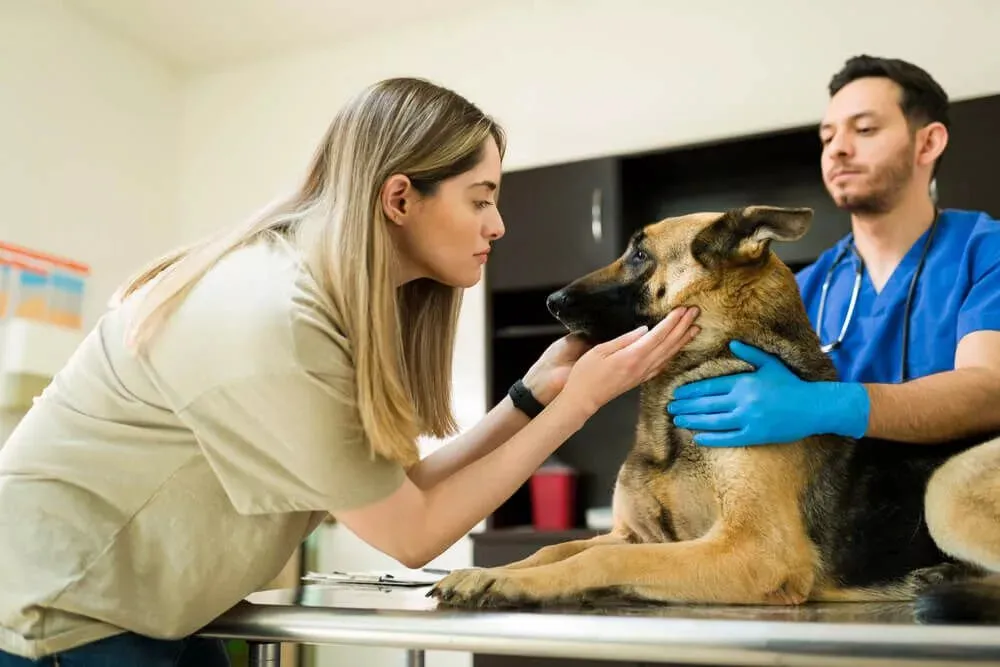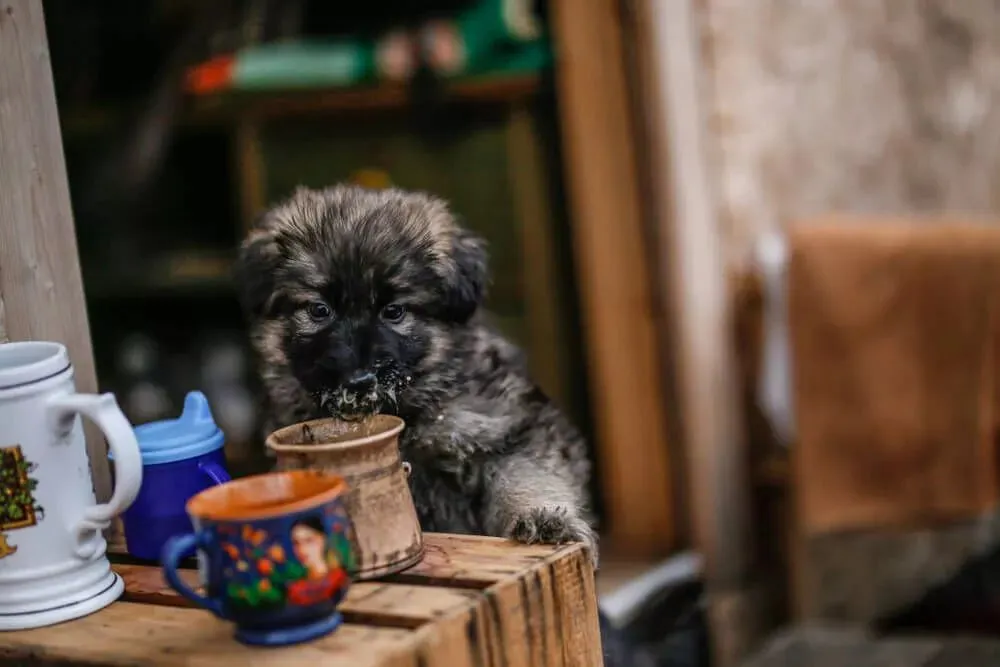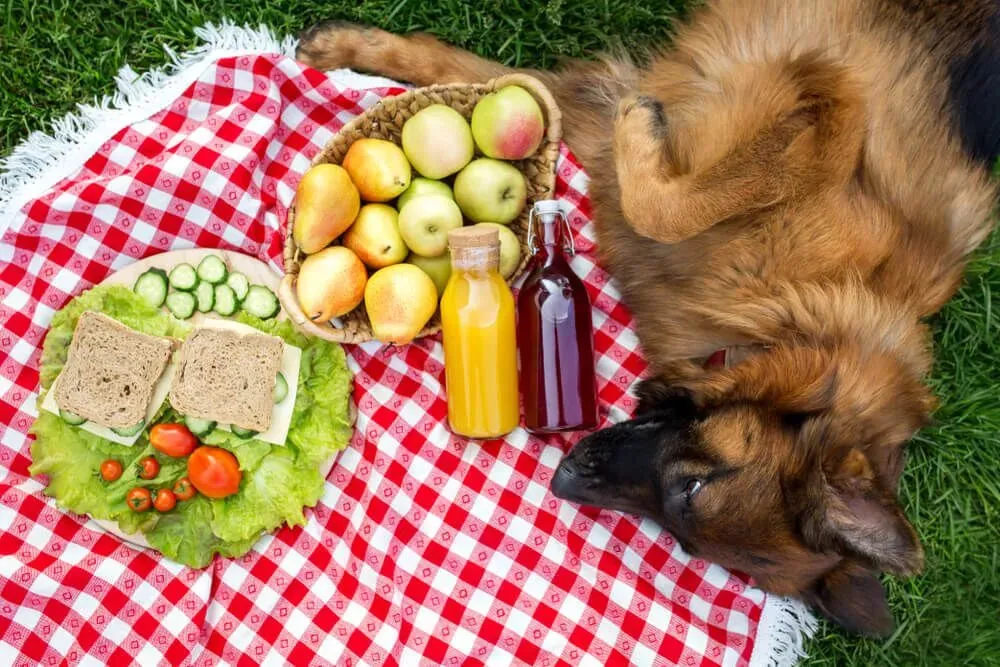It’s tempting to share your favorite foods with your German Shepherd, and while variety can be beneficial, it’s crucial to know what’s safe and what’s not. Many common human foods can cause digestive upset or even be toxic to dogs. Accidental ingestion of toxic foods is a frequent reason for emergency veterinary visits. This guide will provide a detailed list of foods to avoid feeding your German Shepherd to keep them safe and healthy.
Recognizing Signs of Food Toxicity in German Shepherds
 A concerned-looking German Shepherd puppy
A concerned-looking German Shepherd puppy
Knowing the signs of food toxicity is vital for quick action.
If your German Shepherd has ingested a toxic food, be vigilant for the following symptoms:
- Vomiting: Forceful expulsion of stomach contents.
- Diarrhea: Loose or watery stools.
- Lethargy: Unusual tiredness or lack of energy.
- Tremors or Seizures: Involuntary muscle contractions or uncontrolled fits.
- Ataxia: Loss of coordination, leading to a wobbly gait.
- Increased Thirst or Urination: Drinking and urinating more frequently than usual.
If you suspect your German Shepherd has eaten something toxic, immediately contact your veterinarian or a pet poison helpline. These resources can help you determine the severity of the situation and advise on the best course of action, which may include inducing vomiting or observation at home.
Foods That Are Toxic to German Shepherds
 German Shepherd looking longingly at food on a counter
German Shepherd looking longingly at food on a counter
Certain foods can cause serious harm to your German Shepherd’s internal organs. Avoid feeding your dog the following:
Alcohol
Alcohol can have similar effects on dogs as it does on humans, but they are much more sensitive. Alcohol toxicity in dogs can manifest as vomiting, diarrhea, incoordination, excessive drooling, and increased thirst. In severe cases, it can lead to liver damage. During social gatherings, ensure your German Shepherd is kept away from alcoholic beverages.
Garlic, Chives, and Onions
All forms of garlic, onions, and chives, whether raw, cooked, or powdered, are toxic to dogs. These plants, belonging to the Allium family, damage red blood cells, impairing oxygen transport and causing hemolytic anemia. Ingestion can also cause inflammation of the stomach and intestines, leading to vomiting, nausea, and reflux. Be mindful of these ingredients in sauces and prepared foods.
Xylitol
Xylitol is an artificial sweetener found in many products, including baked goods, candies, peanut butter, and toothpaste. It’s extremely toxic to dogs, causing a rapid drop in blood sugar levels, which can result in weakness and even seizures.
Caffeine
Caffeine, present in teas, coffees, energy drinks, and cola, is a neurological stimulant for dogs. It can elevate heart rate, cause hyperactivity and restlessness, and induce vomiting and diarrhea. High doses of caffeine can lead to liver damage if left untreated.
Grapes, Raisins, and Sultanas
The exact mechanism by which grapes, raisins, and sultanas cause toxicity is unknown, but they can lead to irreversible kidney damage. Even a small amount can be harmful to some dogs, and ingestion should be treated as an emergency.
Foods That Are Potentially Harmful to German Shepherds
 German Shepherd sitting patiently near a table with food
German Shepherd sitting patiently near a table with food
These foods may not be toxic in small amounts but can still pose risks to your German Shepherd’s health:
Corn on the Cob
While corn itself is not toxic, corn on the cob can be dangerous if ingested whole. It can cause obstructions in the stomach or intestines, often requiring surgical removal.
Bread Dough
Raw dough containing yeast can cause illness in dogs. The dough continues to rise in the stomach, leading to vomiting, diarrhea, and potentially life-threatening obstructions. These symptoms can persist for several days after ingestion.
Meat on the Bone
Cooked bones, such as those from chicken wings or ribs, can splinter and cause lacerations or perforations in the stomach and intestines. Larger bones can also become lodged, necessitating surgical removal. While the meat itself is safe, the bones are a significant risk.
Key Takeaways for German Shepherd Owners
Protecting your German Shepherd from accidental ingestion requires diligence and awareness. By understanding which foods are dangerous and taking preventative measures, you can ensure their safety. Secure pantries, use pet-proof trash cans, and inform guests about your feeding rules.
FAQ
What human foods are safe for German Shepherds to eat?
Safe human foods for German Shepherds include small quantities of cooked pasta or rice, cottage cheese, lean meats such as chicken, beef, or lamb, and cooked eggs. Always introduce new foods gradually and in moderation.
What fruits are dangerous for German Shepherds?
Grapes, raisins, rhubarb, unripe tomatoes, and stone fruits like cherries, peaches, and plums are harmful to German Shepherds.
Can German Shepherds eat ice cream?
Many dogs are lactose intolerant, and ice cream can cause digestive upset. A small amount as an occasional treat may be acceptable, but frequent or large servings can lead to vomiting and diarrhea.
Are potatoes safe for German Shepherds?
Raw potatoes contain solanine, a toxic compound for dogs. However, baked or boiled potatoes in small amounts are generally safe. Always ensure they are fully cooked and unseasoned.
